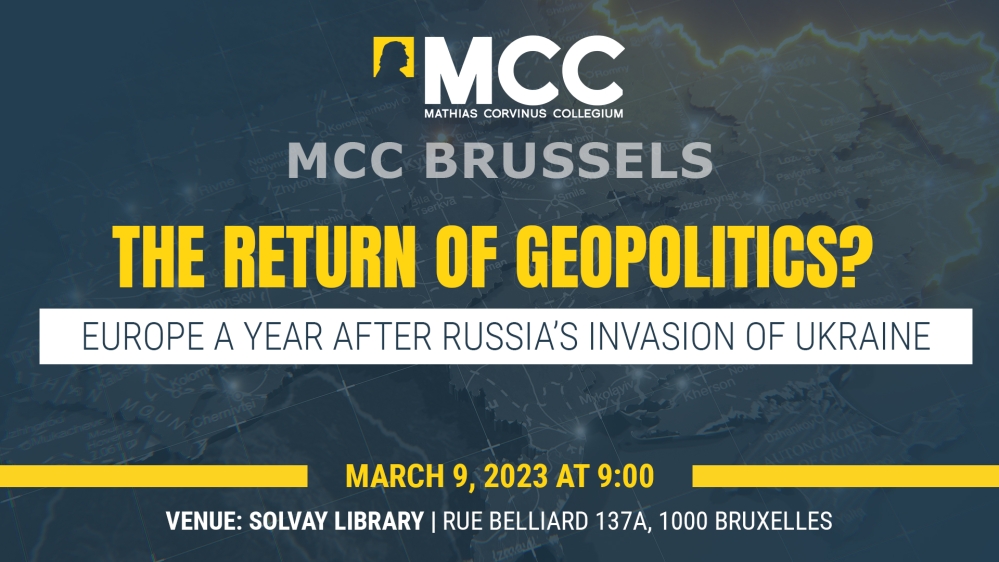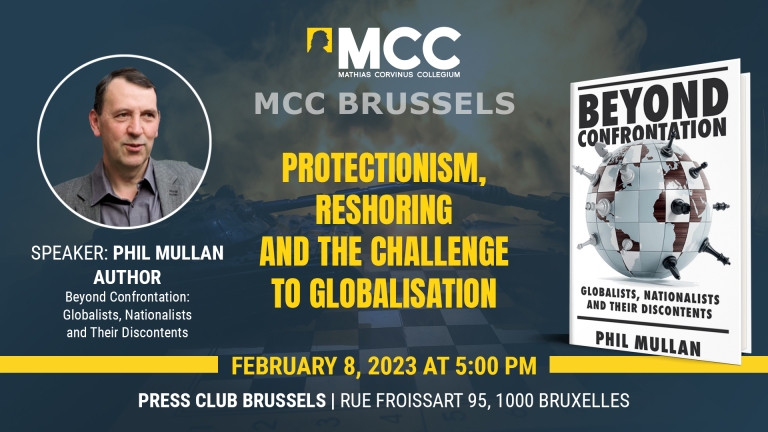We have now reached capacity for this event. Register here for the waiting list
About the event:
Perhaps the Oxford English Dictionary’s word of the year should have been ‘geopolitics’. After a long period where it was almost a dirty word, the idea of taking international strategy seriously at the geographical and historical level has returned with a bang. As the unipolar moment in world history seems to draw to a close, and American hegemony can no longer be trusted to ‘keep the peace’, many are sensing the urgency of understanding how nations relate to their neighbours, to regions, and to regional powers. No starker illustration could be offered than the war in Ukraine, where Russia’s attempt to assert its power has quickly destabilised not just the area, but the whole European region and indeed the world. Understanding what is at stake in international conflict is more urgent than ever.
The ‘return of geopolitics’ signifies that a number of old certainties have been called into question. Globalisation can no longer be assumed to harmonise national interests: however open the world market remains, trade is becoming as much a weapon itself as it is an alternative to military violence. The return of discussion about national interests, national history, and national sovereignty also signifies the end of the dominant assumption that nations are a thing of the past. The question of military and economic power is also being revisited: from strained stockpiles to rising military spending, countries are having to face a new era where economic and military questions can no longer be neatly distinguished.
Nonetheless, many question whether geopolitics is a helpful term, and whether the ‘geopolitical turn’ is anything other than a cover for the re-assertion of a dark militarism in society. Geopolitics has always been a difficult term to pin down, associated as much with mystification as explanation. Geography, it must be admitted, is not destiny. A return to geopolitics needs also to confront the association between the term and the far-right, a lineage that can be easily traced from Haushofer to Dugin. But we cannot dismiss a term based simply on past associations: whether we like it or not, the war in Ukraine and the end of unipolarity mean that all Europeans now have to rehabilitate the art of thinking in geopolitical terms.
What, then, should be the line between national interests and international behaviour? How should countries relate to each other – on the basis of interests or the basis of values? What is the role of national history and national ideals when it comes to conflict? What does it mean to be ‘realistic’ in international affairs? Above all, who should guide the conduct of nations in relation to each other, and what role is there for the wider public in these urgent questions?
Join some of Europe’s top thinkers in the fields of international relations, strategy, military thought and international history for a unique opportunity to probe the contours of our new era.
Programme
09.00
Registration
09.30 - 09.45
Opening remarks - Professor Frank Füredi
09.45 - 11.15
Panel I: The new global order– the return of great-power politics?
For some time, global policymakers have become entranced by the rise of China, India and other non-Western countries. If discussions had been dominated by economic competition, the tone now is increasingly of geopolitical, even military competition. Whilst many Western countries have taken a united line on Russia’s invasion of Ukraine, others have been more circumspect, with many thinking that the US or the EU shares the blame for stoking a confrontation with Russia. These splits on the issue of Ukraine are said to highlight a broader fragmentation of the global order, with questions arising about currencies, supply chains and trade. Indeed, many question whether the era of globalisation is drawing to a close. Whilst this rhetoric may be overblown, what is clear is that the magical thinking of the era of globalisation – that increased trade would automatically bring peace – is over.
Does Russia’s invasion mark the beginning of a new era where rising powers are more likely to flex their military muscles? Is a confrontation with China inevitable? Where will the countries of the ‘global south’ fit in to a new order? Will this new era be marked by a ‘new cold war’ between the US and China, or a return of a broader competition between a variety of ‘great powers’?
Speakers:
- Prof. Petr Drulák, Professor at the Department of Politics and International Relations, University of West Bohemia
- Dr. Diego Fusaro, Professor, Istituito Alti Studi Strategici e Politici, Milano
- Dr. Robert Castel, Chief Security Officer, Israel Nature and Parks Authority
- Dr. Caroline Galactéros, Founder and Chairman, GEOPRAGMA
- Dr. Réka Szemerkényi, Senior Advisor, Transatlantic Strategy, International Republican Institute
Chair: Jacob Reynolds, Head of Policy, MCC Brussels
11.15 - 12.15
Keynote: A geopolitical reckoning: An American perspective on Europe’s place in the world -
- Prof. S. John Tsagronis
- Chair: Prof. Werner J. Patzelt, Research Director, MCC Brussels
12.15 - 13.15
Lunch
13.15 - 14.30
Panel II: Western renewal or global competition: Prospects for NATO, USA and the EU
According to most commentators, the war in Ukraine has prompted a renewal of Western unity. From sanctions to weapons deliveries, from shifts in energy policy to agreements on military spending, Western countries have largely acted in lockstep and seem more united than ever. After the shock of Brexit, the EU seems energised; after the declarations of ‘brain death’, NATO seems essential; after the embarrassments of Trumpism, Biden returns America to its ‘natural’ role of world leadership. Some even go as far as suggesting this marks a return of American-Western global dominance: after the shock of the Afghanistan withdrawal, America has regained its confidence, and competence, on the world stage. The fact that many European countries will pay a heavy price in terms of energy costs and the effects of US domestic subsidies is only seen as proof of the strength of the US-led Western order.
Or is all not as rosy as it seems? Many commentators note that Western countries are fast exhausting their supplies of crucial munitions, weapons deliveries are subject to increasingly bitter spats between Germany and others, and whilst the immediate crisis of winter energy prices may have been averted, Europe will no doubt pay a huge price as it moves away from cheap and plentiful Russian energy.
Is this era one of renewed Western and American hegemony? What are the fault-lines in the supposed unity of Western nations? Does the coming era of reshoring and protectionism threaten the alliance between the US and the EU? Is the West really ready for an era of confrontations and conflicts?
Speakers:
- Prof. Jean-Robert Raviot, Professor in Russian and Post-Soviet studies, Université Paris Nanterre
- Dr. Monika Bartoszewicz, Associate Professor in Societal Security and Safety, Arctic University of Norway
- Dr. Philip Cunliffe, Associate Professor in International Relations, University College London
- Niccolo Soldo, Author and Analyst, Fisted By Foucault
- Dr. Arta Moeini, Research Director, Institute for Peace & Diplomacy
- Chair: Jacob Reynolds, Head of Policy, MCC Brussels
14.30 – 15.30
In Conversation with Frank Furedi: One year after the invasion: Has geopolitics returned?
15.30 – 16.00
Coffee break
16.00 – 17.15
Panel III: Sanctions, energy and how to solve the “Russia question”
The West’s response to Russia’s invasion of Ukraine has thus far been straightforward: sanctions, a move away from Russian fossil fuels, and arms deliveries to Ukraine. Most in the West are united in the idea that Russia must be punished for its invasion, and that Ukraine must be supported to determine on its own terms the post-war settlement. Yet, fissures are emerging among Western countries. Many seem to be growing weary of Ukraine’s insistence that the war is only over when Russia has been pushed out its territory – including Crimea. Whilst Europe seems to have survived this winter without Russian gas, many question whether it can survive another one. Sanctions, too, are being questioned: Russia’s economic performance has held up whilst many industries in Europe are struggling.
Putting aside the coming months and years, some insist we need to grapple the more fundamental issue of Russia’s place in the world. This 21st century ‘Russia question’ – like the ‘German question’ which stalked Europe in the 20th century – will have to be answered sooner or later. Many pin their hopes on the end of Putin and a transition to true democracy in Russia: only then could Russia begin the process of becoming a ‘normal’ European country. Others suggest that even in the absence of a political revolution in Russia, Russia is simply too big and resource-rich to exclude from the Western world indefinitely.
How then should Europe respond to Russia’s invasion? What is Ukraine’s role in conversations about Russia’s future? Can Russia ever be integrated into the continent? Can Europe really overcome its recent energy dependence on Russia? How should we deal with Russia, both in the immediate term after the Ukraine war, and in the years to come afterwards? Will, and should, Europe and the West back Ukraine all the way to Crimea? Do the sheer facts of geography force Europe to answer the ‘Russia question’ – or will Russia remain pariah?
Speakers:
- Dr. Ralph Schöllhammer, Senior Lecturer, Webster Vienna Private University
- Prof. Maria Engström, Professor of Russian, Uppsala University
- Dr. Germano Dottori, Scientific Adviser to Limes, Italian Review of Geopolitics
- Svitlana Morenets, Author, Ukraine in Focus for the Spectator
- Prof. Bill Durodié, Chair of International Relations, University of Bath; visiting professor, MCC Brussels
- Chair: John O’Brien, Head of Communications, MCC Brussels
17.15 – 17.20
Closing Remarks


![20230321_Time for rigour[1].jpg 20230321_Time for rigour[1].jpg](/uploads/default/0001/01/thumb_449_default_medium.jpeg)